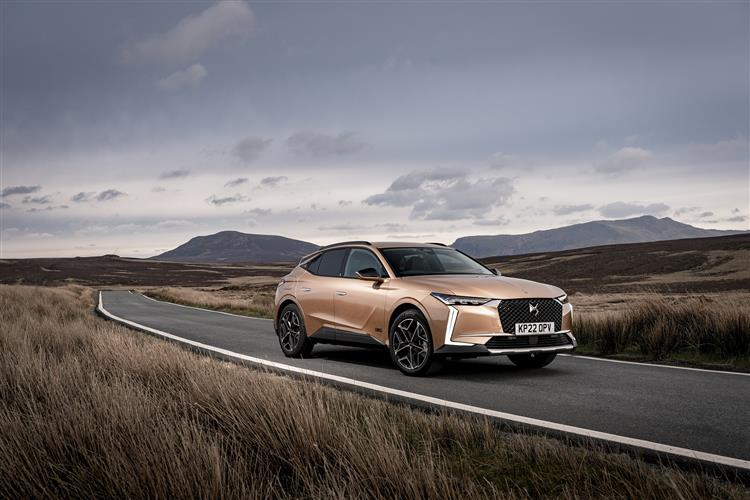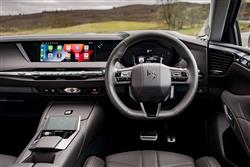FOUR CLOSER (some text hidden) --NONE--
By Jonathan Crouch
This DS 4 compact hatch looks much more competitive with this 48V self-charging Hybrid engine, thinks Jonathan Crouch
Ten Second Reviewword count: 33
The DS 4's ideal engine might just be the 48V Hybrid self charging unit we look at here. This aspirational premium Gallic compact hatch makes a good partner for this clever petrol/electric powerplant.
Backgroundword count: 106
If you're considering a premium badged aspirational family hatch, you're probably not considering the DS 4. Perhaps that rather stylish Gallic contender's worth a second look now though, because it can now be had with a rather appealing Hybrid engine. This isn't one of those Hybrids you can plug-in; the DS 4 line-up already provides one of those. Instead, it's the same 48V self charging powertrain used across a wide variety of Stellantis Group models, which claims to be able to allow the car to run solely on battery power for a significant amount of time in urban traffic. Sounds promising. Let's take a closer look.
Engines and Tech Specword count: 307
The DS 4 Hybrid uses the same 136hp version of this 48V Hybrid powertrain as the smaller DS 3 Hybrid. Which, given the heavier bodyshell of this DS 4, might make you expect fairly tepid performance. But this engine drives the seven-seat Peugeot 5008 along very happily and doesn't struggle with this premium Gallic family hatch, thanks to a useful 230Nm of torque. It's coupled with a clever six-speed dual-clutch e-DSC6 automatic gearbox that incorporates a 28hp electric motor. A 0.9kWh NMC lithium-ion battery powers the self-charging electric system. The petrol engine is a major evolution of the existing PureTech 130 unit, with special development for the Hybrid system. Using three-cylinders with 1,199cc, it works on the Miller cycle, which provides higher thermodynamic efficiency and, therefore, a significant reduction in fuel consumption and CO2 emissions. The engine is also fitted with a special timing chain and a clever variable geometry turbocharger to maximise sustainability and responsiveness at low revs. The permanent magnet synchronous electric motor is integrated into the compact e-DCS6 six-speed dual-clutch transmission and can run on electric power alone at low speeds and under moderate loads. During deceleration, the electric motor acts as a generator to recover kinetic energy and fuel the 0.9kWh battery located under the floor. The system also easily provides power to start the petrol engine. The e-DCS6 gearbox contributes to the comfort and efficiency of this Hybrid model too. Limiting breaks in torque, it gives the feeling of a super smooth ride. The electric motor, inverter and computer are integrated in it to save space and mass. At 10.4 seconds, the zero to 62mph time for this Hybrid DS 4 is 1.2 seconds faster than the existing PureTech 130 model and the 1000-metre standing start time is reduced by 1.3 seconds to 31.7 seconds, compared with the PureTech 130 Automatic engine.
To see the full road test text contact us on 0330 0020 227
Pictures (high res disabled)

.jpg)
|
.jpg)
|
.jpg)
| |||
.jpg)
|
.jpg)
|
.jpg)
| |||
.jpg)
|
.jpg)
|
.jpg)
| |||

|
Statistics (subset of data only)
Min |
Max |
|
Price: |
£33,800.00 (At 17 May 2024) |
£39,000.00 (At 17 May 2024) |
CO2 (g/km): |
21 (WLTP) |
|
Max Speed (mph): |
115 (est) |
|
0-62 mph (s): |
10.4 (est) |
|
Length (mm): |
4440 |
|
Width (mm): |
1830 |
|
Height (mm): |
1470 |
|
Boot Capacity (l): |
430 |
|



